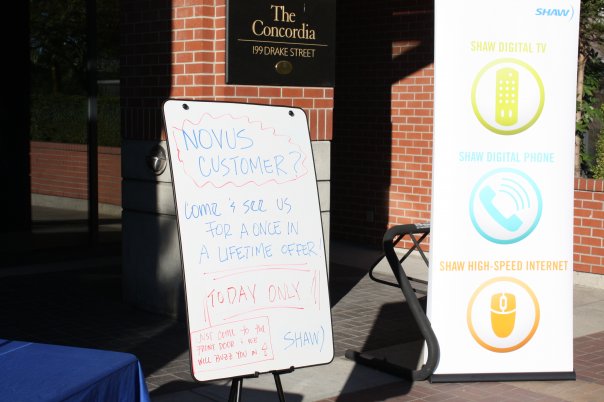 I usually don’t spend a whole lot of time debunking the more crazy conspiracy theories about Net Neutrality because I presume most online users are smart enough not to be suckered into sideshow distractions, usually paid for by providers trying to wave shiny keys at consumers to get them to support things exactly opposite their own best interests. Unfortunately, there are a few shills out there who insist on trying to conjure up bizarre conspiracy theories about Net Neutrality representing some sort of Obama Administration/left wing takeover of the Internet.
I usually don’t spend a whole lot of time debunking the more crazy conspiracy theories about Net Neutrality because I presume most online users are smart enough not to be suckered into sideshow distractions, usually paid for by providers trying to wave shiny keys at consumers to get them to support things exactly opposite their own best interests. Unfortunately, there are a few shills out there who insist on trying to conjure up bizarre conspiracy theories about Net Neutrality representing some sort of Obama Administration/left wing takeover of the Internet.
When Newsbusters, a conservative media watchdog group, bought into this (and also sprang for the deluxe undercoatings, fabric protection, and deluxe floor mats), it was time to fire up the Debunk-o-matic once again and set the record straight.
What is particularly insulting is the ongoing effort to try and co-opt conservatives into this corporate protection circus, when truth be told, conservatives should absolutely be in favor of Net Neutrality for the same reasons any other person, regardless of where they fall on the political spectrum, should be — it protects their rights to be able to speak out on the issues that concern them the most, judged on the quality of their content, not on how much money they can pay to be sure those views can travel unimpeded to interested readers across the country and beyond.
Put on the rubber boots, because we’re going to splash through some inch deep puddles:
Enter the similarly-misnamed ‘net neutrality’ movement, which advocates total government control of Internet browsing. Net neutrality would forbid Internet service providers from regulating traffic on their networks, and would place that regulatory control in the hands of the FCC.
While the left bemoans restrictions by private companies on their subscribers’ use of the Internet, progressives have few qualms with allowing the federal government a say in what we can or cannot see, do, or say on the Internet.
The centralized control of Internet use by the federal government would provide a powerful tool for the censorship of websites deemed politically unfavorable. The current administration’s labeling of right-wing fringe groups as ‘extremists’ and potentially national security threats, and the labeling of town hall protestors as ‘political terrorists’ suggests that the realm of impermissible internet use could conceivably include groups that espouse intense opposition to federal policies.
I think author Lachlan Markay has been stuck in a parallel universe, like in that Star Trek episode, because he defined Net Neutrality the exact opposite of its reality.
The FCC can’t even get rational limits on cable system ownership to survive court review. How Markay believes a naked attempt by the FCC to regulate political content on the Internet will pass muster requires something more than simply writing alarmist claims it will happen because he says it will.
The feeble effort to link town hall protesters and Obama conspiracy theories to the issue of Net Neutrality is a transparent effort to co-opt conservatives into a cause that means standing with the providers waiting to throttle their broadband speeds and charge their favorite websites more money. I don’t believe for a second conservatives trust the local cable or phone company to do the right thing by them, as they continue to be stuck with ever-increasing bills for channels they don’t watch and certainly don’t want to pay for and phone features they don’t want or use, but end up paying for anyway.
Though no elected net neutrality advocate would ever suggest that the movement intends to regulate content, pundits on the left have been far more forthcoming. In March, a blogger at the Huffington Post lauding net neutrality wrote, “We have a very rare opportunity right now to lock in a progressive advantage in Internet communications, information sharing, and Netroots mobilizing.”
Markay attempts to bolster his argument by linking to a Huffington Post blogger that supposedly lets it all hang out in public — conspiracy revealed, case closed. He assumes his readers won’t bother to click on the link, because if they do, they’ll discover Markay’s source didn’t have to be linked via HuffPost, he could have just turned around to the guy figuratively sitting at the desk behind him and quoted him directly. Yes folks, he linked to a “Contributing Editor for NewsBusters.org,” the very site Markay writes for.
Seton Motley isn’t the go-to-guy for the quality expose either. Indeed, Motley himself quoted from Joseph A. Palermo, another HuffPost blogger who penned a piece that proved he didn’t really understand Net Neutrality either.
Palermo instead advocated that progressive causes use broadband to bypass the “media filter” and talk to audiences directly. Motley saw the words “Net Neutrality” in the headline and figured he’d done his job for the day.
Not so much. Not one of these people appears to understand what Net Neutrality is all about.
Net Neutrality is completely above the partisan divide because it insists, regardless of content, if it’s legal it should not be impeded by a broadband provider and should be allowed to travel unfettered across their wires. Indeed, it also demands that the Internet be a true democracy of ideas, not one of entrenched interests with lots of money that can buy their way onto the fast lane while others make due with a potentially slower “free lane” that some providers proposed.
There you have it, straight from the horse’s mouth. The left is seeking net neutrality as a means of consolidating control over the Internet, the same way it sought consolidated control over the airwaves with the Fairness Doctrine, and the same way it is now seeking that same objective in the guise of ‘diversity’ and ‘localism.’ Those on the center-right should not be fooled into thinking that ‘localism’ or ‘net neutrality’ promote free enterprise or free speech.
Yes, three people who completely misunderstand the basic premise of Net Neutrality have weighed in and passed judgment on Net Neutrality. Palermo wasn’t writing about Net Neutrality and it should have not been in his headline. Motley went along for the ride and assumed Palermo knew what Net Neutrality was, and then reflexively attacked just because Palermo plays for the blue team and Motley plays for the red. Markay just provided the frosting for this big cake of wrong and added even more rhetorical sprinkles on top. All that’s missing from this recipe for disaster is a provider to come on by and overcharge everyone for a piece.
The true risk of consolidation of control of the Internet isn’t coming from the federal government, it is coming from the providers themselves. Where Markay has no concrete examples of actual government abuse, I do have real world examples of what happens when Net Neutrality protection is not guaranteed by law. Providers in Canada, where Net Neutrality does not exist, uniformly throttle the speeds of certain content, and at least one provider directly blocked access to a website because of a political/business dispute the site had with that provider.
What should really scare conservatives is not having Net Neutrality. These policies guarantee the right for all Americans to speak their minds and share their views, even those polar opposites Glenn Beck and Janeane Garofalo. Let the best ideas win.


 Subscribe
Subscribe



